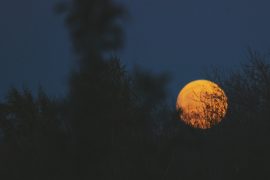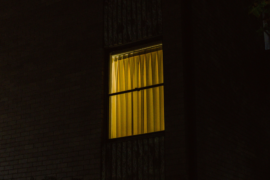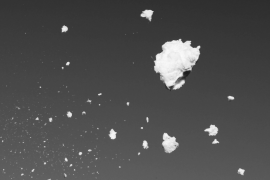A stranger in her own home, in her own marriage, the Mother must confront the cause of this estrangement, her husband, to protect her only true family, her son.
In the kitchen she awaits her husband. Her son is asleep in his room down the hall. She stares at the faded wallpaper of songbirds. In the spring, after the cold quiet of winter, she mistakes the chirps of the hot-blooded birds in the garden for sounds coming from the two-dimensional cardinals, wrens, and orioles plastered to the wall, as if the thaw outside had brought them to life. On such mornings she hears her son, an imaginative child attuned to these little wonders, talking with the birds, softly, as if he were fluent in their sing-song tongue.
Headlights flood the kitchen. The Father is home.
*
Black stone walls tower before the Son, tall to anyone but enormous to a boy of seven. He advances, kicks through a moat of trash, stubs his toes on severed doll limbs, cigarette butts, chicken bones, disposable razors, strangled tubes of toothpaste, coffee filters stuffed with spent grounds, empty bottles of Old Grand-Dad. His armor is motley: a football helmet, pajamas covered in cartoon birds, steel-toed boots four sizes too large, and a short but heavy sword in a leather scabbard hanging from a worn belt. A small gate appears in the stone, an opening just large enough, almost custom cut, for him.
*
The Mother steadies herself, stands straight-backed in front of the kitchen table. “Hello, Husband.”
“Hello, Husband? My, aren’t we formal tonight. Hello, Wife, howdy-do?” The Father in his heavy work boots stomps to the fridge and extracts two bottles of Bud. “Don’t suppose you want to join me?” He opens one bottle and finishes half in one glug. “Where’s the brat?”
“Your son is sleeping. Please keep your voice down.”
“Here it comes. Nag, nag, nag. All that kid does is sleep,” the Father says in a stage whisper.
“We need to talk.”
The Father perches on a kitchen stool across from the Mother, leans on the island, and cups his hands behind his ears. “I’m all ears.”
*
Within the walls, the Son’s eyes adjust to the gloom of an inner courtyard. A scurrying sound, fast, furtive. Opposite, a hallway opens before him. Mildew, rust, astringent chemicals. The smell of his father’s workbench in the garage. Unlit torches line the hallway. He rummages through his pocket, finds a pocket knife, three brightly colored Lego blocks and his mother’s beat-up brass lighter. He doesn’t know how he’s come by it, but it cheers him. He stands on the tips of his toes, pulls down a torch and lights it. The torchlight surrounds him, wavering like a spotlight in search of a star. The Son and the light descend together, farther into the dark and cold.
*
The Father finishes his second beer, pours himself four fingers of Old Grand-Dad, and resumes his perch on the stool like a buzzard. The Mother hates that bourbon. The orange of the label looks like a hazard warning. The Father takes a slug, smacks his lips with satisfaction.
“Things have been bad for a long while. We both know it,” she says.
“Things? What things?”
“You and me. Your drinking. It’s not sustainable,” she says.
“Sustainable? Where’d you get that one? Oprah?”
“I mean, we can’t keep going like this.”
He takes another slug.
*
The dark congeals like grease in a cold frying pan. The Son holds the torch aloft in one hand and with the other points the sword before him, shuffling forward in tiny steps. A rasping sound blows through him, rattles his bones.
A shape slithers and snaps, a coil of wires, a whip. It rises, an inky blotch in the darkness. Twenty feet or more it grows. Reptilian, the creature stands not ten feet from him. He drops his torch and grips his sword with two hands. The blade trembles.
The Son knows that It hates him. Hates his presence, his existence. He looks into Its gelatinous eyes and sees hurt, fear, hate. And, beneath it all, something sad and familiar. Its jaws snap. Claws materialize out of the darkness and lunge at him. The Son leaps and rolls away. Stones erupt around him. Debris flies in every direction. With fantastic speed, the creature attacks and retreats.
*
The Mother struggles to say something conciliatory and diffusing, but the words won’t come. The Father smiles tightly, examines his empty glass, then hurls it at her. It sails a foot over her head and shatters on the wall behind her. Shards fall in her hair, glisten there like glitter.
His hands on the counter now, his knuckles white with the weight of him. “You spring this on me now? I never wanted the brat. He’s a fucking bargaining chip to you, that’s all. Leverage. That’s all he’s ever been. And I’m a hostage. In this little fucking house,” he says, looking around. “With these stupid fucking birds. A stupid brat and a stupid bitch of a wife.”
The Mother plucks the largest pieces of glass from hair and places them in a pile on the table.
*
The Son parries, dodges, leaps. He is swift but growing tired. Through the shadows, he discerns a pattern to this creature’s movements. He backs away, crouches near the wall, counts three Mississippis and leaps forward. His sword connects with something solid. Hot blood bursts forth from the shadows. He presses on, drawn to the creature’s hatred, striking again and again, slashing and hacking through the piercing screams.
*
“Are you through?” The Mother asks.
The Father is thrown by her composure. “I’m sorry.” He fetches the dust brush and pan from beneath the sink, changes his mind, grabs a new glass and fills it from the same bottle. “You just make me so mad sometimes.”
=“Are you through?”
“I said I’m sorry. This job is driving me nuts. They’re saying there won’t be any bonuses this year. Possible lay-offs. And then all your constant nagging.”
“Say, I’m through.”
He looks at her, at the glass in his hand, and the remains of the bourbon dripping down the wall behind her, brown rivulets running over the birds’ faded feathers. “I’m through. Happy?”
The Mother nods to herself, once, twice, three times. “We’re through. I’m through taking your shit and your apologies. Through listening to excuses and making them to our son. You’re so fucking through. Now, get out of my house.”
The Father squints at her over his glass, takes another sip. “Come on, you wanted to talk. Let’s talk. Be reasonable.”
“Get. Out.”
She sees his mind working, scheming, trying to wriggle out from under her resolve and back into her life. She chants “get out, get out, get out,” her eyes closed until she feels the Father push past her. The door slams. The glass in the window, cracked and weakened from one of his earlier rampages, shatters.
*
The creature lies huddled in the corner bleeding out. The Son stands above It. The creature writhes, tries for one final lunge at him, but the Son, battle-hardened now, strikes first, sure and pitiless. The sword severs its body in two. The Son crouches beside his split enemy, watches its death throes, presses his hand to its cold flesh.
*
In a daze, the Mother sweeps up the glass. Her hands shake with adrenaline. She remembers the Son in his bed. He had to have heard that. He’s probably sobbing, traumatized. But it’s ok, now. Their real life together is just beginning.
She drops the dustpan and runs to his room but, not wanting to frighten him further, catches herself and tries to open the door in gentle increments. The hinges, though, caw like startled crows. He is awake. He looks older to her, a trick of the light she supposes.
“Hey, there, little man. Can’t sleep?” Her voice cracks.
The Son smiles and is young again. A child. Her child. “I was dreaming. It was a nightmare but it turned out okay in the end. I think I was the hero.”
“I know you were. You’re my hero. My sweet, sleepy hero.” She leans over him, holds him tight. Holds him and sobs. “It’ll be okay, little man. Everything will be okay, I promise.”
*
His mother smothers him. He touches her hair and it feels rough, like something is sprinkled in it. The light coming from the kitchen catches it, sparkles. A cold and damp draft blows from the broken window.
“Is Dad home yet?”
“Do you hear the birds, honey? The chirping?” She tries to engage his imagination, starts to hum the cardinal’s song.
“Where is he?”
“Your dad might have to go away for a while.”
“Go away?”
“We’ll talk in the morning. I promise. Now you need your sleep.”
“But I’m not tired.” He wriggles out of her embrace.
The Mother pulls the blanket over him, tucks it beneath the mattress tightly. He lets her tuck him in. But underneath his compliance, he’s surprised to find, is anger. No more than a shard, a scrap, an inkling, a little darkness writhing in the corner of his chest—but already he can feel Its hunger. Already, It starts to grow.
“You need your sleep. Good little boys need a lot of sleep to grow into strong young men,” she says, closing the door.
“Nag, nag, nag,” It says in the dark.
KENT KOSACK is a writer, editor, and educator based in Pittsburgh, PA. He has an MFA in Creative Writing from the University of Pittsburgh where he teaches composition and creative writing. Kent also serves as the Director of the Educational Arm at Asymptote, a journal of world literature in translation, and as a guest editor providing feedback on submissions for the Masters Review. His work has been published in Tin House (Flash Fidelity), the Cincinnati Review, the Normal School, Hobart, and elsewhere. See more at: www.kentkosack.com
Like what you’re reading?
Get new stories or poetry sent to your inbox. Drop your email below to start >>>
OR grab a print issue
Stories, poems and essays in a beautifully designed magazine you can hold in your hands.
GO TO ISSUESNEW book release
Ghosts Caught on Film by Barrett Bowlin. Order the book of which Dan Chaon calls “is a thrilling first collection that marks a beginning for a major talent.”
GET THE BOOK




